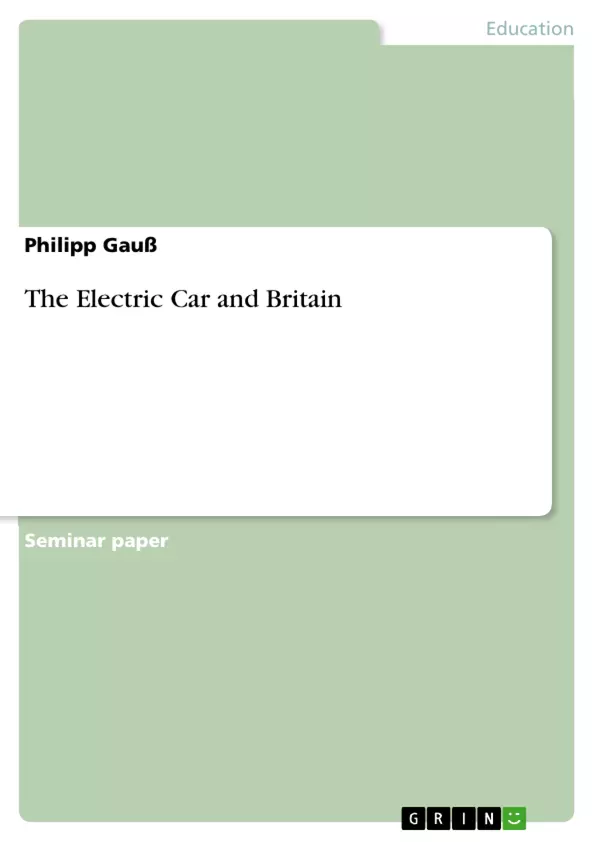By the year 2020, it is expected that the current amount of 900 million motor vehicles worldwide will double to 1.8 billion, mainly driven by China and India. Within the last year the price has fluctuated between €77 and €144 per Barrel crude oil. The continuously rising crude oil price can be directly linked to the motor vehicle growth rate of over 40% p.a. in the Asian countries. Due to this major increase of mobility, the currently available oil reserves are expected to reach their turning point in approximately ten years. In mid-2005, Great Britain, for the first time in their history, became a net importer of oil.
To extend the time frame of oil reserves, bio fuels are being used although they are at odds with production of aliments. By switching cultivated land from growing aliments to bio fuel, the price of corn rose by 25% within three months last year.
That is why alternative mobility with the use of renewable energies would offer a great opportunity of almost neutral CO2 transportation and would also avoid any contradiction with aliment production.
My paper is going to analyze Great Britain’s efforts to support and improve the environmental friendly mobility, especially the electric mobility, due to the leading role of Great Britain within the European Union on this alternative mobility technology.
Inhaltsverzeichnis (Table of Contents)
- Introduction
- Government Regulation and Incentivizes
- Government Programmes
- Vehicle Taxation
- Low Carbon Vehicle Partnership LowCVP
- Plugged-In Place
- London
- Local OEM and EVs
- Smith Electric Vehicles
- Lightning GT
- Conclusion
Zielsetzung und Themenschwerpunkte (Objectives and Key Themes)
This paper aims to analyze Great Britain's efforts to promote environmentally friendly mobility, particularly electric mobility, highlighting its leading role within the European Union in this alternative mobility technology.
- The impact of rising crude oil prices and global vehicle growth on energy dependence.
- Government regulations, incentives, and initiatives aimed at encouraging electric vehicle adoption.
- The role of local original equipment manufacturers (OEMs) and their contributions to the electric vehicle sector.
- The challenges and opportunities associated with electric vehicle development and implementation.
- The potential of electric mobility as a solution to environmental concerns and energy security.
Zusammenfassung der Kapitel (Chapter Summaries)
- Introduction: This chapter establishes the context for the paper by outlining the global trends in vehicle growth, rising oil prices, and the need for alternative mobility solutions. It highlights Great Britain's position as a net importer of oil and explores the potential of electric mobility as an environmentally friendly alternative.
- Government Regulation and Incentivizes: This chapter delves into the various government programs, tax incentives, and partnerships that have been implemented to encourage the adoption of electric vehicles in Great Britain. It examines the role of the Low Carbon Vehicle Partnership (LowCVP) and the "Plugged-In Place" initiative in driving innovation and infrastructure development.
- London: This chapter focuses on the city of London and its efforts to promote electric vehicles. It discusses the specific regulations, incentives, and infrastructure developments implemented by the London government to support the adoption of electric vehicles within the city.
- Local OEM and EVs: This chapter explores the contributions of local original equipment manufacturers (OEMs) to the electric vehicle sector in Great Britain. It highlights the work of companies like Smith Electric Vehicles and Lightning GT, showcasing their innovations and role in developing electric vehicle technologies.
Schlüsselwörter (Keywords)
The primary keywords and focus topics of this work include: electric vehicles, alternative mobility, government incentives, renewable energy, environmental sustainability, energy security, local OEMs, and the role of Great Britain in promoting electric vehicle adoption within the European Union.
Frequently Asked Questions
Why is Great Britain focusing on electric mobility?
Rising crude oil prices, energy security concerns, and the need for CO2-neutral transportation have led the UK to take a leading role in alternative mobility technologies.
What government incentives exist for electric vehicles in the UK?
The government uses vehicle taxation benefits, programs like the "Plugged-In Place" initiative, and partnerships like LowCVP to encourage adoption.
Which local manufacturers (OEMs) are involved in EV production?
The paper highlights companies such as Smith Electric Vehicles and Lightning GT as key local players in the electric vehicle sector.
What is the role of London in the UK's electric vehicle strategy?
London has implemented specific regulations and infrastructure developments to support electric vehicles within the city context.
How does electric mobility relate to food production?
Unlike biofuels, which compete for cultivated land used for food, renewable electricity for EVs avoids the conflict with global food prices.
- Citation du texte
- Philipp Gauß (Auteur), 2010, The Electric Car and Britain, Munich, GRIN Verlag, https://www.grin.com/document/157327



